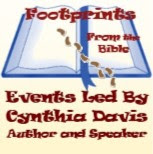Rahab
and Peter are Bible people who had their lives changed when they let God take
over. When they stepped out of their comfortable zones, they discovered that
God was more than able to accomplish more than they expected.
At
first, Rahab seems like an odd person for God to use at all. Then you realize
that God rarely uses the person we’d choose. Rahab is introduced in the 2nd
chapter of the Book of Joshua as a ‘harlot’. She is, it turns out, a woman with
a heart for God, though. She hides the Israelite spies and tells them, “I know that the Lord has given you the
land…for the Lord your God is he who is God in the heaven above and on earth
beneath.” (Judges 2:9-11)
Believing
that God was in control led Rahab to act treasonously (in the eyes of those in Jericho 6:23 ). Eventually she married one of
the spies and became the mother of Boaz, who was great grandfather of David
(Matthew 1:5)! I found this story so intriguing that my book Rahab’s Redemption is based on these few
little hints in the Bible. Sometimes we can learn more by reading between the
lines to discover the faith of the women in the Bible.
God
asks Peter repeatedly to step outside of his comfortable box. One such time is
recounted in Acts 10. The Roman Centurion Cornelius is told by an angelic
vision to “send men to Joppa, and bring
one Simon who is called Peter...” (Acts 10:5). For Peter, a Jewish man, to
go to visit a gentile was unheard of. However, Peter himself has a vision and
tells Cornelius, “You yourselves know how
unlawful it is for a Jew to associate with or to visit any one of another
nation; but God has shown me that I should not call any man common or unclean.
So when I was sent for, I came without objection.” (Acts 10:28-29)
Peter
hears Cornelius’ testimony of his own vision and understands, “God shows no partiality, but in every
nation any one who fears him and does what is right is acceptable to him.”
(Acts 10:34-35) He then preaches the Gospel to the centurion and all his family
and friends who are converted and baptized.
Just
this week, while reading an online meditation (d365.org), I came to this prayer
which gave me pause and, for me, summarized the theme of these past weeks: “God, deliver me today from self-preservation
so that I might believe you without reservation. Amen.”
Both
Rahab and Peter didn’t consider ‘self-preservation,’ which would have dictated
that they remain obedient to the laws of man. Instead they were obedient to the
Spirit of God. By being willing to step out in faith, Peter converted an enemy.
Rahab had to step out of her comfort zone in order to rescue the spies. In
doing that she found welcome and learned the meaning of living a life of faith
in God.
May
we each listen more to the Spirit that says, ‘Have no fear. Come, follow me’
and less to the little voice that says we have to follow certain rules in order
to ‘be safe’ or ‘successful’. Take Paul’s claim as your own, “For God did not give us a spirit of
timidity, but a spirit of power, of love and of self-discipline” (2 Timothy
1:7) and live boldly with God in control!
Next time, we’ll start our final series of this
Pentecost journey that started with living into the joy of Psalm 100 and
learning to Abandon Self to God with Charles de Foucauld. We also saw how
ministry grows like a seed and ‘we know not how.’ Each step along the way has
been another way of looking at how we can live faith-filled lives with our
Loving God in control.





